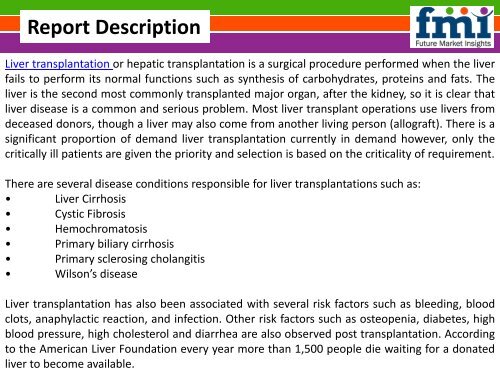Liver Transplantation Market Forecast and Segments, 2016-2026
Liver transplantation or hepatic transplantation is a surgical procedure performed when the liver fails to perform its normal functions such as synthesis of carbohydrates, proteins and fats. The liver is the second most commonly transplanted major organ, after the kidney, so it is clear that liver disease is a common and serious problem.
Liver transplantation or hepatic transplantation is a surgical procedure performed when the liver fails to perform its normal functions such as synthesis of carbohydrates, proteins and fats. The liver is the second most commonly transplanted major organ, after the kidney, so it is clear that liver disease is a common and serious problem.
You also want an ePaper? Increase the reach of your titles
YUMPU automatically turns print PDFs into web optimized ePapers that Google loves.
Report Description<br />
<strong>Liver</strong> transplantation or hepatic transplantation is a surgical procedure performed when the liver<br />
fails to perform its normal functions such as synthesis of carbohydrates, proteins <strong>and</strong> fats. The<br />
liver is the second most commonly transplanted major organ, after the kidney, so it is clear that<br />
liver disease is a common <strong>and</strong> serious problem. Most liver transplant operations use livers from<br />
deceased donors, though a liver may also come from another living person (allograft). There is a<br />
significant proportion of dem<strong>and</strong> liver transplantation currently in dem<strong>and</strong> however, only the<br />
critically ill patients are given the priority <strong>and</strong> selection is based on the criticality of requirement.<br />
There are several disease conditions responsible for liver transplantations such as:<br />
• <strong>Liver</strong> Cirrhosis<br />
• Cystic Fibrosis<br />
• Hemochromatosis<br />
• Primary biliary cirrhosis<br />
• Primary sclerosing cholangitis<br />
• Wilson’s disease<br />
<strong>Liver</strong> transplantation has also been associated with several risk factors such as bleeding, blood<br />
clots, anaphylactic reaction, <strong>and</strong> infection. Other risk factors such as osteopenia, diabetes, high<br />
blood pressure, high cholesterol <strong>and</strong> diarrhea are also observed post transplantation. According<br />
to the American <strong>Liver</strong> Foundation every year more than 1,500 people die waiting for a donated<br />
liver to become available.


















